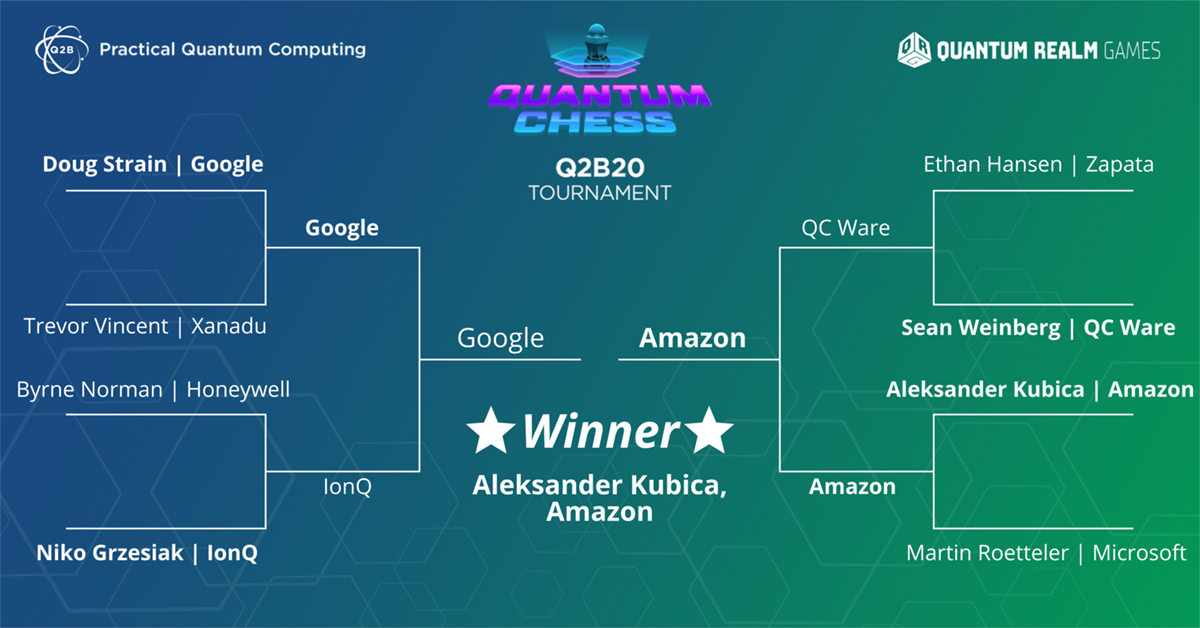Chess is experiencing a resurgence. Goliath Games told NPR its chess set sales were up 1,048% year-over-year in November 2020. That surge is thanks in part to the success of the wildly popular Netflix series, The Queen’s Gambit. But it wasn’t just traditional chess that broke ground: 2020 also marked the debut of the first-ever quantum chess tournament.
“Quantum chess is a variant of the classical game of chess with a few extra moves, which are designed to mimic some quantum phenomena,” said Aleksander Kubica, the winner of the inaugural quantum chess tournament, and a research scientist with the AWS quantum computing team. Not only did he win, he did so having started playing quantum chess only once — the weekend before the event. The tournament took place Dec. 7-9 at Q2B 2020, a quantum computing industry conference.
“The game was developed by a graduate student at the University of Southern California, Chris Cantwell. Back in 2016, when I was a graduate student at Caltech, Chris would come to Caltech and talk to one of the quantum researchers, Spiros Michalakis. So, I knew of the game, but I never actually played it until a few days before the tournament.”
Cantwell has written that he developed the game in part because: “Games can provide an environment in which people can experience the strange behavior of the quantum world in a fun and mentally engaging way.”
While quantum chess was brand new, both to Kubica and most of the world, Kubica had an existing passion for conventional chess. “I like playing chess. When I was in middle school, I even participated in a few regional chess tournaments. I enjoy thinking about chess puzzles when I eat breakfast. Each morning I solve five puzzles on Chess.com.
When the opportunity to enter the tournament arose, Kubica saw a chance to combine one of his passions with his profession. Kubica, who has a PhD in quantum physics from Caltech, spent three years as a postdoctoral fellow at Perimeter Institute for Theoretical Physics in Waterloo, Canada, before joining Amazon in October 2020.
Kubica spoke with Amazon Science about the tournament, his strategy, and his advice for those who might want to try their hands at quantum chess. He also noted that, while he enjoyed the series, he didn’t actually watch The Queen’s Gambit until after the tournament.
Q. How does quantum chess differ from standard chess?
Quantum chess is a two-player game which uses the same board with 64 squares and 32 pieces as classical chess — pun intended! All the moves which are allowed in classical chess are also allowed in quantum chess. However, in quantum chess there are a few extra moves, such as the split and merge moves. (Ed note: The game’s rules allow for “a trifecta of quantum evolutionary phenomena: superposition, entanglement, and interference.)
AWS scientists coauthor 13 QIP 2021 quantum computing papers
Researchers affiliated with Amazon Web Services' Center for Quantum Computing presented at the Conference on Quantum Information Processing. See the accepted papers here.
The split move, as its name suggests, consists of first splitting a piece into two parts and then moving them independently to two different unoccupied squares. For instance, on an empty chessboard a queen on d4 could be split and moved to b6 and h4. Such a move would then result in the queen being with equal chances on either b6 or h4. Interestingly, the precise location of the split queen would remain undetermined as long as the player makes no attempt to capture opponent's pieces with that queen. The merge move, on the other hand, tries to combine two parts of a split piece into one.
It is not, however, the inverse of the split move.
The split and merge moves demonstrate the ideas of superposition and constructive/destructive interference, which are some of the most fundamental concepts in quantum physics. The extra moves introduce an element of randomness into the game, making quantum chess non-deterministic.
I personally like it, as it makes the outcome of the game less predictable even if the players' skill levels differ significantly.
Q. What was your strategy and how well did it work? Did you have to adapt at all?
Before the tournament I practiced a bit with my friend, Tomas Jochym-O'Connor, a quantum researcher. We played a few games and thought about new strategies incorporating extra moves unique to quantum chess. To our surprise, we discovered that one of the most popular chess openings, the Sicilian Defence, is somehow flawed. Namely, by splitting a knight, white can set up a trap for black, and with a bit of luck white may capture black's king and win the game.
The tournament was organized in a knockout format with three rounds. There were eight participants representing various companies interested in developing quantum technologies, including Google, Microsoft, and Amazon. Each game was a 20-minute game with additional 20 seconds added after each move. The winning condition was to either capture the opponent’s king or win on time.
In my first tournament game I played white against Martin Roettler from Microsoft. I opened with standard 1.e4, to which my opponent replied 1…c5 — the Sicilian Defence! I realized that this could be my chance and decided to implement the split knight trap. Unaware of imminent danger, Martin continued to develop his position, falling into the trap and eventually losing the game in just a few moves. I was very happy and relieved that the gamble paid off.

I am sure that in classical chess Martin would have easily defeated me. However, we played quantum chess and I had a few quantum moves up my sleeve.
In the final game, I had to face Doug Strain from Google. Once again, my opponent was definitely better in classical chess than I am. I had to withstand the initial classical assault, but once we started making quantum moves I got lucky and gained the upper hand. Because the position became quite complicated, Doug ran out of time and I won.
Q. What would you say to someone who wanted to learn to play quantum chess?
I would encourage everyone to simply start playing quantum chess. You can download the game from Steam. I would suggest that, instead of learning the rules of quantum chess, you try to figure them out first. As a physicist and a researcher, that is what I do on an everyday basis — I try to figure out how things work. I hope that playing quantum chess will be a lot of fun for you. Nothing feels better than an innocuous pawn move, which simplifies a complicated chess position, causes many entangled pieces of your opponent to suddenly disappear from the chessboard and paves your way to victory.


















